Dear Mr. Jobs:
Congratulations on your recent launch of the new iPad device! I know that many pundits were more whelmed than overwhelmed (having fallen for the hype they themselves created; I recall no hyperbole out of Cupertino), but I think it is important to point out the acidic combination of bad memory and lack of foresight that allows such mavens to be hypercritical without applying the company’s past accomplishments to the likely developmental future of your wonderfully promising device. The potential is all there.
But my main point in writing you this open letter, Mr. Jobs, is to urge you to allow the e-book portal on the laudable iBooks section of the iPad to have a section devoted to free e-books, with content provided by users who format their own works using the easily available ePub platform iBooks already utilizes.
I strongly believe this would do for digital books and magazines what podcasting did for digital audio: bring millions of eyes to the device, allow niche publications that otherwise would be unaffordable in the traditional bound-print model, democratize the end-user experience regarding popularity of such works, and give yet another voice to creative people previously unable to garner what has long been considered the imprimatur of traditional publication.
As someone who created one of the world’s most popular music podcasts, Podrunner, I can attest firsthand to the power of such access, and to the broadening, enriching, and enlightening experience of finding and directly interacting with a hitherto unidentified, and indeed unavailable audience. It is empowering at all points of the transaction, from creator to consumer. For what is the purpose of such technology but access?
I believe such a free e-book portal — call it bookcasting — would not harm the present book industry one whit. It would instead provide an outlet and a potential audience for writers denied such by the expense and often the subjective whim of commercial publishing. The need to turn a profit would not be part of the bookcasting equation. It would allow writers the opportunity to supplant or even derive the totality of their income from reader donations.
Bookcasting would provide readers with access to perfectly fine authors denied publication because, while they may be talented artists, they are not necessarily commercial ones, and publishing them is not justified under the current and much more expensive publishing model. Readers would also have access to authors for whom there has simply not been room in a crowded marketplace with limited shelf space.
Bookcasting would even allow established traditional-publishing authors to have a venue for works outside the purview of their genre, books long out of print, or books considered too obscure or experimental for mainstream publication. It would also give traditional publishers an adjunct to offer works, interviews, and other material as a gateway to their commercial publications.
I believe that bookcasting would also usher in a renaissance of literary periodicals. Many prestigious bedroom periodicals of high repute that have been uable to remain viable due to production and distribution costs would suddenly be able to thrive, with overhead drastically reduced if not altogether eliminated.
I will be one of your first bookcast providers and one of your first bookcast readers. And I think there are millions of us out there.
Thank you for your attention, and I wish you the best of luck in all your future endeavors.
Sincerely,
Steven R. Boyett
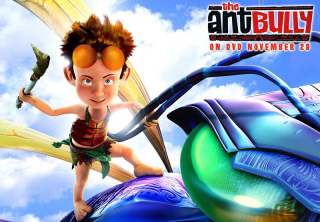
 I fear this post places me firmly in the Land of Mawkish Sentimentality, a porous-bordered, perfumey territory rife with poodle fur, diamondcollared kittycats, waifs with giant brown eyes, and the pervasive music of Counting Crows. The very embodiment of the Tarot Fool, I proceed regardless.
I fear this post places me firmly in the Land of Mawkish Sentimentality, a porous-bordered, perfumey territory rife with poodle fur, diamondcollared kittycats, waifs with giant brown eyes, and the pervasive music of Counting Crows. The very embodiment of the Tarot Fool, I proceed regardless.
 Among the few things I know I’ll miss when I leave Los Angeles is Grauman’s Chinese Theater. (The Mann Corporation took it over some years back, but only cads with no sense of history call it Mann’s Chinese Theater.) It’s a venerable old warhorse of oldtime palatial theaters, among the last such in Los Angeles. The Orpheum is even bigger and more plush, but in disrepair and not used much. There’s an L.A. Theater Conservancy,
Among the few things I know I’ll miss when I leave Los Angeles is Grauman’s Chinese Theater. (The Mann Corporation took it over some years back, but only cads with no sense of history call it Mann’s Chinese Theater.) It’s a venerable old warhorse of oldtime palatial theaters, among the last such in Los Angeles. The Orpheum is even bigger and more plush, but in disrepair and not used much. There’s an L.A. Theater Conservancy, 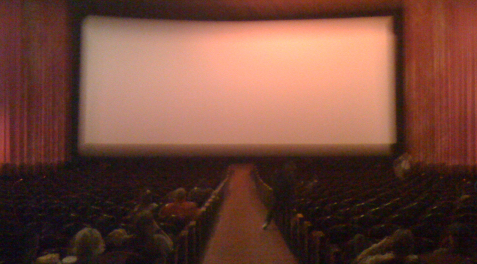 Because I’m moving after being here for over half my life, I have been making a point to visit my favorite spots these last few weeks. I saw The Lovely Bones and The Imaginarium of Dr. Parnassus at the Hollywood Arclight (though I haven’t actually seen Avatar at the glorious Cinerama Dome (the anchor of the Arclight complex) because quite frankly it’s on the bottom of my list of movies to see. Yesterday I went to see The Book of Eli at the Chinese.
Because I’m moving after being here for over half my life, I have been making a point to visit my favorite spots these last few weeks. I saw The Lovely Bones and The Imaginarium of Dr. Parnassus at the Hollywood Arclight (though I haven’t actually seen Avatar at the glorious Cinerama Dome (the anchor of the Arclight complex) because quite frankly it’s on the bottom of my list of movies to see. Yesterday I went to see The Book of Eli at the Chinese. The Chinese was the first theater I went to when I moved to Los Angeles in 1984. I saw Children of the Corn there. Most of the cast showed up, and so I also got my first taste of spoiled little child actors. But having come from Gainesville, Florida, seeing a movie in a theater the size of a county where the people in the movie were also in the theater was — well, not cool, and not surreal. The word that comes to mind is enframing.
The Chinese was the first theater I went to when I moved to Los Angeles in 1984. I saw Children of the Corn there. Most of the cast showed up, and so I also got my first taste of spoiled little child actors. But having come from Gainesville, Florida, seeing a movie in a theater the size of a county where the people in the movie were also in the theater was — well, not cool, and not surreal. The word that comes to mind is enframing. One of the most fun movie nights I’ve ever had was when a big group of us got together at the Chinese to see Titanic on opening night. The anticipation was huge and the crowd was electric. (Possibly the best movie night I ever had was attending the premiere of 2010 at the Westwood Village with David Gerrold and sitting with Arthur Clarke, Peter Hyams, and Harlan Ellison. Good lord. Shame the movie sucked.)
One of the most fun movie nights I’ve ever had was when a big group of us got together at the Chinese to see Titanic on opening night. The anticipation was huge and the crowd was electric. (Possibly the best movie night I ever had was attending the premiere of 2010 at the Westwood Village with David Gerrold and sitting with Arthur Clarke, Peter Hyams, and Harlan Ellison. Good lord. Shame the movie sucked.)
 Getting my own ballot for the 2009
Getting my own ballot for the 2009 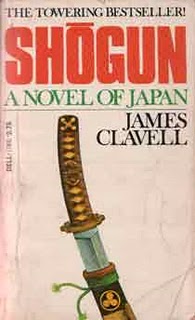 This is a quirk of mine I haven’t run across in anyone else: I won’t go see movies based on books I really love. Maybe the movie version is great; I don’t care. It won’t be a gnat fart next to the movie in my head. And whether they get it right or get it wrong, I’ll be stuck with that imagery from then on, because we are hardwired such that visual imagery takes precedence, and tends to overhwelm everything else — including imagination.
This is a quirk of mine I haven’t run across in anyone else: I won’t go see movies based on books I really love. Maybe the movie version is great; I don’t care. It won’t be a gnat fart next to the movie in my head. And whether they get it right or get it wrong, I’ll be stuck with that imagery from then on, because we are hardwired such that visual imagery takes precedence, and tends to overhwelm everything else — including imagination.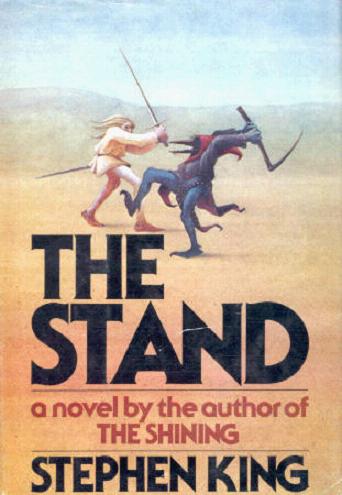 And I wished I’d never seen it. The James Clavell novel was and remains one of my favorite books. I’ve read it a bunch of times. But after seeing the miniseries, the next time I sat down to read the novel, it was nearly impossible to not to imagine Richard Chamberlain as John Blackthorne. And while Chamberlain was good in the TV version, the dude was not John Blackthorne. And good for TV (especially at the time) ain’t gonna come close to the unlimited budget my brain has for these things. So I learned something there.
And I wished I’d never seen it. The James Clavell novel was and remains one of my favorite books. I’ve read it a bunch of times. But after seeing the miniseries, the next time I sat down to read the novel, it was nearly impossible to not to imagine Richard Chamberlain as John Blackthorne. And while Chamberlain was good in the TV version, the dude was not John Blackthorne. And good for TV (especially at the time) ain’t gonna come close to the unlimited budget my brain has for these things. So I learned something there.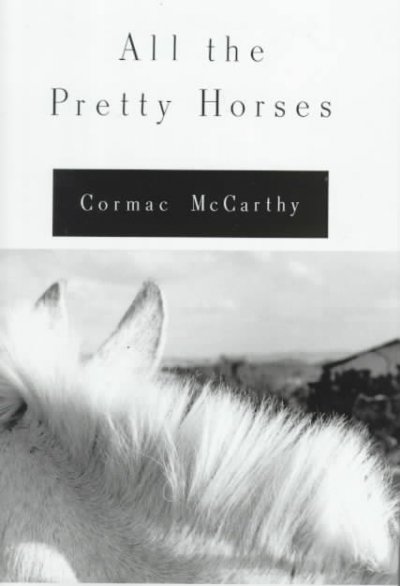 And so began a practice of not watching movies based on my favorite books. I mean, seriously, did anyone alive think that Disney was going to do anything to A Wrinkle in Time besides gang rape it? Don’t people realize Blood Meridian is as much about the writing as it is about what happens?
And so began a practice of not watching movies based on my favorite books. I mean, seriously, did anyone alive think that Disney was going to do anything to A Wrinkle in Time besides gang rape it? Don’t people realize Blood Meridian is as much about the writing as it is about what happens?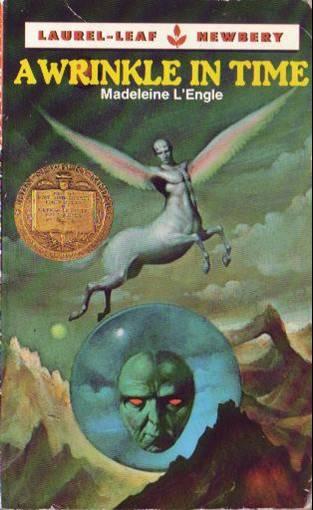 So I went and saw The Fellowship of the Ring at the Cinerama Dome in Hollywood (saw all of the movies there, in fact). And found myself very weirdly bifurcated about the movie. On the one hand it wasn’t remotely the vision I had for the book. On the other hand, I thought Jackson had done about the best possible job that anyone could have done (except for some horrendous shaky-cam fight scenes and the stupid dwarf-tossing jokes that pulled me right the hell out of the movie). I had to see it again to wrap my head around Jackson’s vision, and it was like that for all three films. And much as I enjoyed the books as a kid, I no longer have the sentimental attachment to them that I once did, so I don’t mind my precious gray cells being polluted by Jackson’s imagery. I thought Alice Sebold’s The Lovely Bones was a beautifully written novel, but I didn’t have an emotional attachment to it and didn’t mind seeing the Jackson film (which I liked a lot).
So I went and saw The Fellowship of the Ring at the Cinerama Dome in Hollywood (saw all of the movies there, in fact). And found myself very weirdly bifurcated about the movie. On the one hand it wasn’t remotely the vision I had for the book. On the other hand, I thought Jackson had done about the best possible job that anyone could have done (except for some horrendous shaky-cam fight scenes and the stupid dwarf-tossing jokes that pulled me right the hell out of the movie). I had to see it again to wrap my head around Jackson’s vision, and it was like that for all three films. And much as I enjoyed the books as a kid, I no longer have the sentimental attachment to them that I once did, so I don’t mind my precious gray cells being polluted by Jackson’s imagery. I thought Alice Sebold’s The Lovely Bones was a beautifully written novel, but I didn’t have an emotional attachment to it and didn’t mind seeing the Jackson film (which I liked a lot).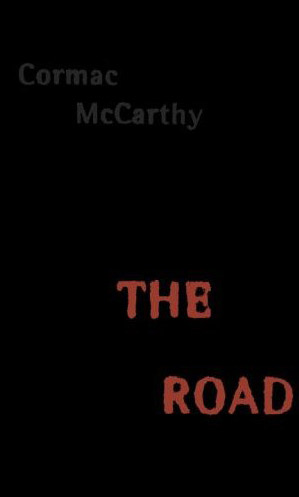 I saw No Country for Old Men because I thought it was one of McCarthy’s weaker novels (I once quipped that it was a Miami Vice episode written by the best writer in America, and then recently learned that he’d originally written it [or intended it, can’t remember offhand] as a screenplay. See, cynicism makes you psychic. Unfortunately a real cynic knows that a real psychic is also usually a Cassandra. But I digress.) I thought it was hilarious that it won an Oscar for Best Screenplay Adaptation, because the Coens didn’t adapt a damn thing, they just made the book a movie, slavishly rendering about 95% of the novel, which is why the ending plays so oddly in a theater. It’s a book ending. But even though it was extraordinarily well done and I love the Coens, I couldn’t judge the movie at all because I knew everything I was about to see and hear. They didn’t translate it from one medium to another. But I wouldn’t see All the Pretty Horses, The Road, or the upcoming Blood Meridian (about the best-written novel I’ve ever read) even if I’d written the screenplay and was cast in the lead.
I saw No Country for Old Men because I thought it was one of McCarthy’s weaker novels (I once quipped that it was a Miami Vice episode written by the best writer in America, and then recently learned that he’d originally written it [or intended it, can’t remember offhand] as a screenplay. See, cynicism makes you psychic. Unfortunately a real cynic knows that a real psychic is also usually a Cassandra. But I digress.) I thought it was hilarious that it won an Oscar for Best Screenplay Adaptation, because the Coens didn’t adapt a damn thing, they just made the book a movie, slavishly rendering about 95% of the novel, which is why the ending plays so oddly in a theater. It’s a book ending. But even though it was extraordinarily well done and I love the Coens, I couldn’t judge the movie at all because I knew everything I was about to see and hear. They didn’t translate it from one medium to another. But I wouldn’t see All the Pretty Horses, The Road, or the upcoming Blood Meridian (about the best-written novel I’ve ever read) even if I’d written the screenplay and was cast in the lead.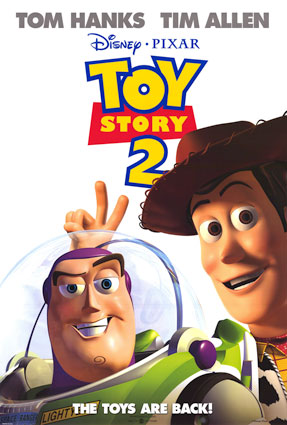 It’s weird to me that people tend to assume you have to see a movie if you liked the book. Sez friggin who? There’s a very real chance I wouldn’t go see a movie based on one of my own novels or screenplays for the same reason as all of the above: the movie in my head will always be a thousand times better. No one believes that when you say it, but I can prove it because I’ve never seen Toy Story 2 and never intend to, and I wrote the second draft of the damned thing.
It’s weird to me that people tend to assume you have to see a movie if you liked the book. Sez friggin who? There’s a very real chance I wouldn’t go see a movie based on one of my own novels or screenplays for the same reason as all of the above: the movie in my head will always be a thousand times better. No one believes that when you say it, but I can prove it because I’ve never seen Toy Story 2 and never intend to, and I wrote the second draft of the damned thing. My Webster’s lists the verb form of “parrot” as “to repeat by rote.” That was pretty much my impression of what a parrot does, too. Then I met Alexander.
My Webster’s lists the verb form of “parrot” as “to repeat by rote.” That was pretty much my impression of what a parrot does, too. Then I met Alexander.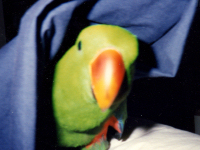

 because he seems to have a crush on her. (He likes girls a lot better than boys anyhow, but Tiffany is a special case for him.) He says “Hi” to her when she’s in her backyard, in a special tone he reserves exclusively for her. It sounds like a guy at a bar radar-locking on a babe a couple of stools down. You can almost here the “well, hel-LO there.”
because he seems to have a crush on her. (He likes girls a lot better than boys anyhow, but Tiffany is a special case for him.) He says “Hi” to her when she’s in her backyard, in a special tone he reserves exclusively for her. It sounds like a guy at a bar radar-locking on a babe a couple of stools down. You can almost here the “well, hel-LO there.” Alexander loves to watch Powerpuff Girls and Dexter’s Lab. He laughs at appropriate moments (sometimes I hear it in stereo when he and Maureen laugh together — in identical voices). He has a thing for anything that drones, like a fan or a leaf blower, and will talk like mad when a drone is going. When Mo composes he sings along, in time and on key. I’ll never get used to hearing them do call-and-response, with Alexander basically playing “Simon” and getting annoyed if you don’t replicate his pattern (which he varies as he goes). At the end of this post are two recordings of Alexander accompanying Maureen (or vice versa, really), one a call-and-response, the other pretty much an improvised duet.
Alexander loves to watch Powerpuff Girls and Dexter’s Lab. He laughs at appropriate moments (sometimes I hear it in stereo when he and Maureen laugh together — in identical voices). He has a thing for anything that drones, like a fan or a leaf blower, and will talk like mad when a drone is going. When Mo composes he sings along, in time and on key. I’ll never get used to hearing them do call-and-response, with Alexander basically playing “Simon” and getting annoyed if you don’t replicate his pattern (which he varies as he goes). At the end of this post are two recordings of Alexander accompanying Maureen (or vice versa, really), one a call-and-response, the other pretty much an improvised duet.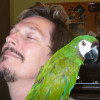 I don’t think you have to read me much to figure out that I’m not a very schmaltzy, widdle fwuffy bunny kinda guy, and I definitely deliberated before blogging about the birds (“The boys,” as we call them). But if
I don’t think you have to read me much to figure out that I’m not a very schmaltzy, widdle fwuffy bunny kinda guy, and I definitely deliberated before blogging about the birds (“The boys,” as we call them). But if 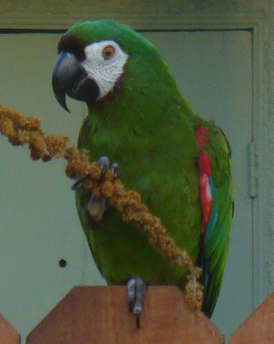 Murdoc is a
Murdoc is a 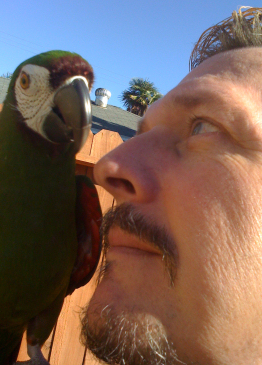 and walk across me to get to her. What woke me up most mornings when I stayed with Mo was Murdoc climbing the metal footboard. Mo would preen him and I would lie there imagining the damage his beak could do to me if he wanted it to.
and walk across me to get to her. What woke me up most mornings when I stayed with Mo was Murdoc climbing the metal footboard. Mo would preen him and I would lie there imagining the damage his beak could do to me if he wanted it to.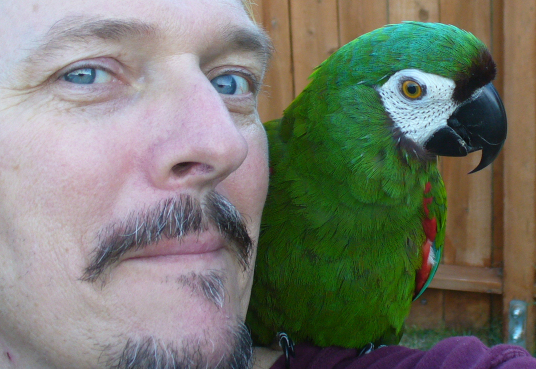 Murdoc is generally grumpy and not very social. (People and their pets, yah?) Often I feel sorry for him because he’s had a hard life and he’s pretty much broken. Mostly he just wants to be left alone. He loves me, though, and I’ve grown to love him. In fact love saved Murdoc, honestly.
Murdoc is generally grumpy and not very social. (People and their pets, yah?) Often I feel sorry for him because he’s had a hard life and he’s pretty much broken. Mostly he just wants to be left alone. He loves me, though, and I’ve grown to love him. In fact love saved Murdoc, honestly. Apart from the holiday traffic and wallblind idiocy of drivers whose ears go flat to their head as they stop in the middle of the road in utter hawkshadowed panic, this tends to be my favorite time of year. Besides the meridian at which I look back on the previous year and look forward to the next, for some reason it’s usually my busiest and most creative time of year. I always have more projects going on and more outlets for them.
Apart from the holiday traffic and wallblind idiocy of drivers whose ears go flat to their head as they stop in the middle of the road in utter hawkshadowed panic, this tends to be my favorite time of year. Besides the meridian at which I look back on the previous year and look forward to the next, for some reason it’s usually my busiest and most creative time of year. I always have more projects going on and more outlets for them.